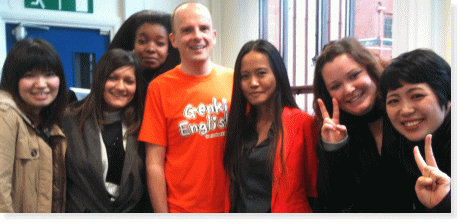
Some of the students on the Education Policy and Entrepreneurship for Development course.
Today I was invited back by the University of Newcastle to give my lecture to the students on the Masters of Education course in Education Policy and Entrepreneurship for Development.
First the Doctor in charge gave a run through the phonics programmes and the research they’d done on the effectiveness of phonics and Genki English. Then we had some very cool videos about phonics teaching in Ghana.
Then it was my turn. Just like last year I was invited as an “Education Entrepreneur” and it was a trip through why I started Genki English (appalling ways of teaching, kids sleeping in class, inequality between public and private schools), how we teach (finding out what the kids want to learn & how they want to learn it), how successful we have been (180 countries, every school in Thailand, 1 billion students by 2012) and the problems we face (the Okinawa problem, teacher apathy!) I also talked about the research projects in developing countries, private vs. public and I also left on a question “do we really need teachers at all?” which is something they’ll be covering in other parts of the course.
Then lots of really good questions from the students (exactly how did you develop the curriculum? What to do with teenagers? Use of mother tongue in the class? What research data do we have? Does it really work even with no teacher?)
Back to ground level
After a few months focussing on Genki English business development (i.e. getting more Genki English sales) then it was really good to get back to the education development issues. It is nice to sell a load of Download Packs (thank you very much, it looks like we’ll have another record breaking month this month!), and that is really important to fund things, but it’s how much we are helping kids in the worlds’ poorest areas that really motivates and excites me. It’s always good re-seeing the results of the India and China programmes and to see how it is affecting the kids there, because in the day to day running of things you tend to forget the big picture.
Room to Read
Then lunch with some people talking about some very exciting ways to do more education development work using more corporate ways of doing things, not just small scale entrepreneurship. Very exciting. After reading the Leaving Microsoft to Change the World book (highly recommended) last week about the amazing Room to Read programme, this is also something I’ve been really interested in. We have a really good programme, it’s now a case of how quickly we can get it out to more schools on a huge scale, not just thousands, but 100s of thousands of schools.
So very, very motivating and I also got a name check in the acknowledgement section of The Beautiful Tree book!
Thank you very much again for inviting me back and I’m really looking forward to the future, it’s a whole new chapter and there are so many more amazing things out there to be done!




Hi Richard,
I was wondering if you could expound on the “Okinawa Problem, teacher apathy” which you mentioned in your post. Arigato, I hope you could make time to come to Okinawa this coming August.
E
Yeah… then the “Okinawan problem” I mentioned is that with the public worker exams, if you get high scores you go to certain jobs, if you get the lowest scores you become a primary school teacher in Okinawa. It’s like Planet of the Apes where they are eating the good corn and planting the left over seeds. What we need in schools is not the leftovers, but the best!